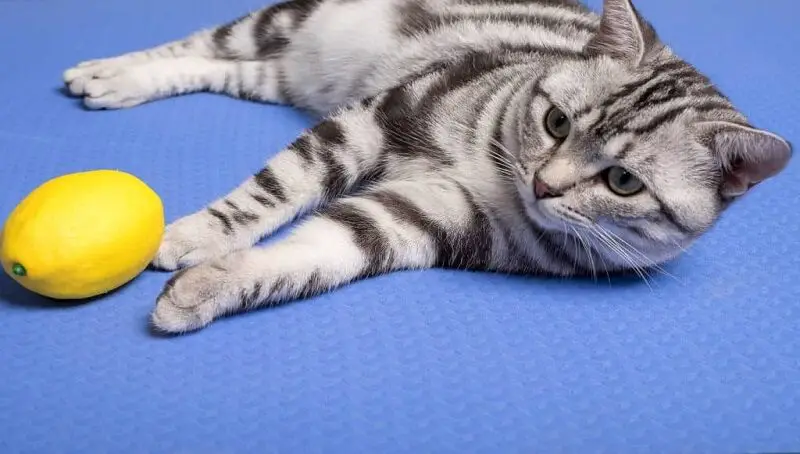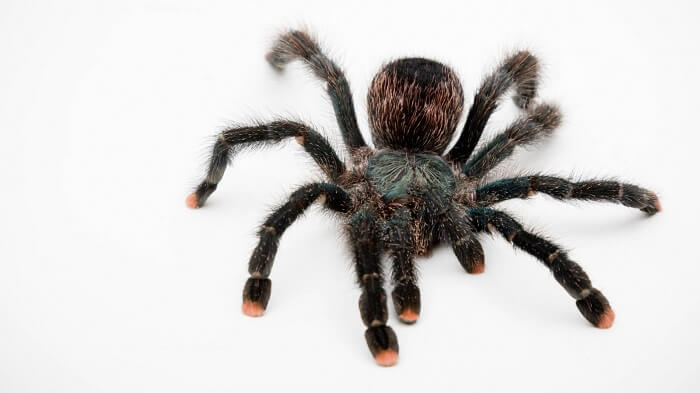In general, a small amount of lemon is enough to cause gastrointestinal symptoms in the cat. The lemon tree, as well as its fruit, contain toxic substances, so the cat, and other animals, should not have access to them. Think about how your cat responds to any citrus. She will most likely retreat and flee to another part of the house, as cats find citrus repellent.
All citrus fruits, from grapefruit, and oranges, to green lemons and yellow ones, are toxic to cats. Keep in mind that any part of the fruit, from the seeds to the fruit itself and its peel, can be toxic or even lethal to the cat.
The substances found in lemons, Citrus limon, are toxic to the cat, even if you and your family can safely ingest the lemon. Toxic compounds in lemons include linalool, limonene, along with psoralens. The latter compound is phototoxic, meaning it can cause skin burns after exposure to sunlight.
Symptoms of lemon poisoning in cats
After eating any part of the lemon, the cat will develop some or all of these signs:
- diarrhea
- excessive salivation
- vomiting
- possible photosensitivity
- depression
- lethargy
- skin irritation or itching, weakness
- cold limbs
- liver failure
- tremor
- collapse
- low blood pressure
- In extreme cases, it can be suddenly lethal.
Causes of lemon poisoning in cats
Three compounds in lemon, limonene, linalool, and psoralen are toxic, if not lethal, to your cat.
Limonene is a terpene, which induces the citrus smell of lemons. D-limonene has been used in shampoos and perfumes. The small amount present in dog products is safe for most dogs. For cats, it can prove to be lethal. Limonene is also used in flavor compounds, cosmetics, and cleaning products. Keep all of these away from the cat.
You might also like my articles on whether cats can eat grass, garlic, or oats.
Linalool also gives lemons the smell of citric. It is used as an insecticide in soaps and as a fragrance in lotions. Linalool is also used as an insecticide itself.
Psoralene leads to photosensitivity problems in cats. It is used as a treatment for certain skin disorders.
Diagnosis of lemon poisoning in cats
 If your cat eats a considerable amount of lemon, go with it immediately to your veterinarian. Take the lemon or the part of the tree with you for testing to facilitate the diagnosis.
If your cat eats a considerable amount of lemon, go with it immediately to your veterinarian. Take the lemon or the part of the tree with you for testing to facilitate the diagnosis.
You should expect your veterinarian to ask you a number of questions and give your cat a complete physical examination, including urine analysis and blood testing. The biochemical profile of the blood and complete blood count help your veterinarian eliminate other problems and accurately determine the toxins that affect the cat. Your veterinarian may also examine your cat’s feces and vomited material to identify the source of the toxins.
The potential for worsening cat symptoms increases with the amount of lemon or tree lemon that the cat has ingested. Your cat may also undergo neurological testing, which will allow your veterinarian to evaluate coordination and reflexes.
Treatment of lemon poisoning in cats
Once your veterinarian discovers the cause of your cat’s symptoms, he can also determine the most appropriate treatment. Because the cat could breathe a lemon’s essential oil into its lungs, inducing vomiting is not an option. Instead, your veterinarian could perform gastric lavage to remove as much lemon and toxins from her digestive system as possible. In addition, your veterinarian will administer activated charcoal to stop the absorption of any toxic compound into the bloodstream.
If you’ve found your cat eating lemon despite finding the smell of repulsive citrus, wash your cat’s fur and skin with a mild soap and clean it with warm water.
The treatments your veterinarian offers are supportive, including fluids that rehydrate your cat and adjust any electrolyte and blood glucose imbalance that your cat may have.
Your cat may receive supplemental oxygen and anticonvulsant medication if the tremor becomes severe.
Recovery in case of lemon poisoning in cats
Your cat should recover well from this intoxication if it has had rapid veterinary care. Symptoms of intoxication are short-lived. Do not treat superficial cat intoxication.
- If the cat consumes any essential oil that is found in lemon, the prognosis is not exactly good.
- If you have a cat that spends time both inside and outside, keep it inside for at least 48 hours after receiving phototoxicity treatment.
- Your veterinarian will advise you to bring your cat in to monitor her blood biochemical levels. He will look at the level of functioning of the liver and kidneys.
- Before taking your cat home, put all citrus products in a closet or inside the refrigerator. Citrus-flavored products containing any known toxins should be kept in a place where the cat cannot reach.
- Read labels carefully when buying cat care products or sprays.
Can I spray my cat with lemon water?
Lemons are one of the most effective and natural ways to get rid of fleas due to their high levels of citric acid. Spraying or brushing with lemon water on your cat’s fur can help you get rid of fleas. Slice a lemon and let it infuse in boiling water. After the water cools down, squeeze it into a spray bottle, as this will be safe.
Lemons are a common household fruit that contains compounds that, although beneficial to humans, are toxic to your cat.




